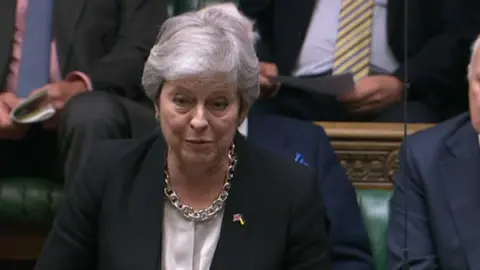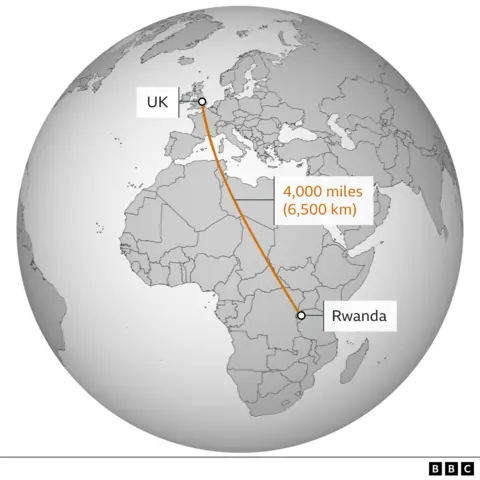Rwanda asylum seeker policy: Ex-PM Theresa May criticises government plan
 BBC
BBCFormer prime minister Theresa May has criticised the government's plan to send some asylum seekers to Rwanda.
Mrs May told the Commons she did not support the policy due to her concerns over whether it met standards on "legality, practicality and efficacy".
Home Secretary Priti Patel said the scheme would be "a major blow to people smugglers" and would stop people dying on dangerous routes to the UK.
The policy has been criticised by charities and opposition parties.
Mrs May, who also served as home secretary overseeing the UK's immigration policy between 2010 and 2016, asked if the trial scheme would lead to an increase in trafficking of women and children - after reports that only single men making illegal crossings to the UK would be sent to Rwanda.
Under the scheme - announced last week - people deemed to have entered the UK unlawfully will be flown to the African country, where they would be processed, and if successful, would have long-term accommodation in the African country.
Responding to a statement on migration by Ms Patel, Mrs May said: "From what I have heard and seen so far of this policy, I do not support the removal to Rwanda policy on the grounds of legality, practicality and efficacy.
"If it is the case that families will not be broken up, does she not believe and where is her evidence that this will not simply lead to an increase in the trafficking of women and children?"
But Ms Patel defended the policy saying: "Change is needed because people are dying attempting to come to the UK."
She told MPs: "This partnership is the type of international co-operation needed to make the global immigration system fairer, keep people safe, and give them opportunities to flourish.
"This will help break the people smugglers' business model and prevent the loss of life, while ensuring protection for those who are genuinely vulnerable."


How would the Rwanda trial scheme work?
- According to a memorandum of understanding between the two governments, the UK would screen asylum seekers "without delay" after their arrival in the UK and then provide Rwanda with basic details of each person it wanted to transfer
- Rwanda would have to approve all requests before they were transferred, and the arrangement would last for five years.
- After arriving in Rwanda each asylum seeker would be given accommodation and support and would be free to come and go from their accommodation at all times, the memorandum says.
- If successfully processed the asylum seeker would be offered long-term accommodation in the African country
- Those who are not recognised as asylum seekers by Rwandan authorities will be removed to a country they have a right to reside in
- The UK would also resettle "a portion of Rwanda's most vulnerable refugees" in the UK

Shadow home secretary Yvette Cooper condemned the policy as "unworkable, unethical and extortionate" and said it was designed to "distract from years of failure" to tackle illegal immigration.
Ms Cooper highlighted the lack of information from the home secretary on costs.
She said: "Will she admit the £120m she has announced doesn't pay for a single person to be transferred.
"She hasn't actually got an agreement on the price for each person. In fact, the £120m is the eyewatering price the Home Office is paying just for a press release."
The home secretary said that some of the tone used to describe the UK's partnership with Rwanda was "quite xenophobic".
Ms Patel personally pushed through the scheme with a rare "ministerial direction", meaning she has taken responsibility for it.
She had to personally approve the scheme after her officials voiced concern over the lack of evidence to demonstrate value for money.
On Tuesday evening, Prime Minister Boris Johnson also called Rwandan President Paul Kagame to reiterate his determination to work with the African nation.
Last year, 28,526 people are known to have crossed the English Channel in small boats, up from 8,404 in 2020.
